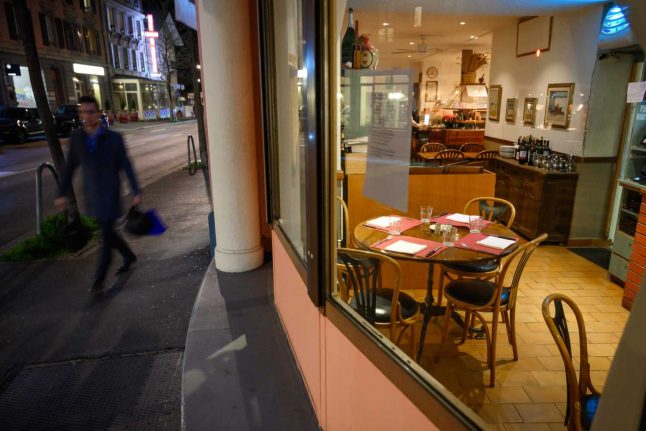In a press conference on Wednesday, Prime Minister Simonetta Sommaruga and Health Minister Alain Berset announced the easing of restrictions which began on April 27th.
While some of these had been announced previously, others – including removing restrictions on restaurants, pubs museums, art galleries, libraries and on sporting competitions – were surprising as these were initially planned to reopen on June 8th.
Sommaruga said that the relaxations were sooner than expected largely because of the success of the lockdown measures, however she warned that the battle was not over.
“We have achieved a lot. We don't want to endanger that,” she said. “We will have to live with the virus for a while.”
Minister of Health Alain Berset said that while reopening bars and restaurants was originally planned for June 8th, doing so on May 11th “is a good way to learn to live with the virus.”
Swiss authorities also stopped short of imposing making face masks o, although masks are recommended in public transport – particularly in peak hours.
This is the latest plan to ease restrictions in Switzerland.
Schools
Primary and lower secondary schools will be again allowed to open from May 11th.
The specific regulation of schools is set to take place at a cantonal level. No social distancing rules have been laid out by the federal government, but they may be introduced by the cantons.
Daniel Koch, spokesperson for the Federal Office of Public Health, said “It is very rare for children to transmit and get the virus. Children very rarely infect other children. The situation is stable and there is no contradiction that the schools are reopened – it is understandable and correct.”
Universities, vocational colleges and high schools will also be allowed to host events again, provided it is with groups of five or fewer people.
Grammar school exams will however not go ahead, with the 2020 vocational baccalaureates being decided purely on experience.
Restaurants and pubs open from May 11th
Perhaps the most surprising news from Wednesday’s announcement was that restaurants in Switzerland would again be allowed to open on May 11th, rather than June 8th.
To do so however, they will need to comply with a strict set of requirements.
No more than four people will be allowed to sit at one table, while all guests must be seated. Therefore, pubs will be allowed to open provided seating is provided.
Groups of guests must sit more than two metres away from other groups, or be separated by some form of partitioning.
Parents and their children will be an exception to the four-person limit, with families allowed to sit groups larger than four.
Museums, galleries and libraries
Another surprising aspect of the announcements is that museums would again be allowed to open on May 11th.
These venues will be subject to entry restrictions and hygiene requirements similar to those seen in supermarkets across Switzerland.
Public transport
Public transport will again be allowed to open in Switzerland, with transit networks running according to their regular timetables from May 11th onwards.
The government also announced a package to support the domestic aviation industry, however no indication was given as to when domestic flight schedules would return to normal.
Sports and gyms
From May 11th restrictions on sporting pursuits will also be relaxed, both for professional and for recreational sport.
Gyms will be also allowed to open, provided they could show they were complying with social distancing and hygiene regulations.
As of May 11th, elite team training as well as grassroots sport in groups of five or fewer would again be allowed across the country.
The authorities also gave the go ahead to professional sporting competitions, with Switzerland’s Super League again allowed from June 8th.
Switzerland relaxes coronavirus lockdown for professional and recreational sport
This means that the country’s top-flight football competition will be back after only a three-month break.
The games will however take place in front of empty stadiums until at least August.
While grassroots sport will be allowed from May 11th only with groups of up to five, elite and professional sporting competitions will be allowed to begin full training on the same date.
When doing so however these sports will need to ensure that they comply with hygiene requirements as handed down by Swiss authorities.
What will remain closed?
Zoos and botanic gardens are at this stage closed until at least June 8th.
Similarly, events with over 1,000 people are banned until August.
Health Minister Alain Berset said during the press conference that the ban on large-scale events would be reconsidered at a Federal Council meeting on May 27th.
“You can also look at neighbouring countries. They had already pronounced these bans by the end of August.
“Hygiene measures cannot be properly observed at major events and contact tracing is also difficult. It affects a lot of events and I know it's difficult. But it's good if you have clarity now.”



 Please whitelist us to continue reading.
Please whitelist us to continue reading.
Member comments